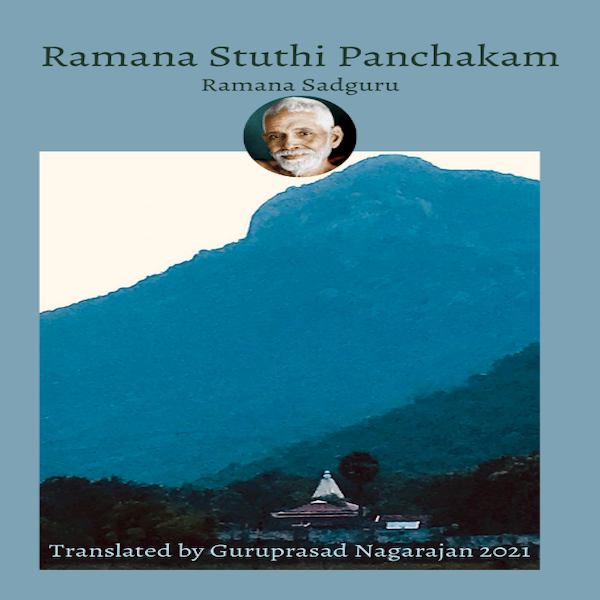AruNai eesan eduth aNaindhidum
Anban en guru naayagan;
KaruNaiye vadivaga nindridu
Karpaga tharu vaaginon
Word meaning
AruNai eesan = Arunachala Siva; aNaindhidu = embraced in a protective manner; anban = dear one; naayagan = chief, lord; karuNai = compassion; karpagam = wish fulfilling celestial tree
Meaning
Bhagavan was adopted and raised by Arunachala himself. He is the object of my affection and love, my guru. He is verily the form of compassion and grace, he bestows the wishes of his devotees like the wish fulfilling celestial tree, kalpatharu.
The moment young Venkataraman heard the magic word Arunachala from his relative, he was possessed by His grace. From then on, every step of Bhagavan’s journey was conducted by Arunachala himself. Bhagavan makes many references to this ‘unsought domination’ in aksharamanamalai and other works.
In Arunachala padhigam, verse 3, he says:
‘Irai unai ninayum eNNamae naNNa
Enai unadharut kayitral eerthu …’
Meaning, Arunachala! Even though I had no thought of you ever, you drew me to yourself with your rope of grace’.
In verse 3 of aksharamana malai he says:
Agampugundh eerthu un aga gugai siraiyai
amarvithadhen kol Arunachala
Meaning
Arunacahala! You entered my home (that is my heart, because agam means both heart and home), took me and imprisoned me in your home (here Bhagavan says un aga gugai which means your heart cave). What to say of your grace?
In the book Uniqueness of Ramana Maharishi, the author makes an interesting observation on how totally surrendered Bhagavan was when he came to Arunachala:
When he reached Tiruvannamalai, he threw away the packet of sweets that had been given to him by Muthukrishna Bhagavatar’s sister. He was not anxious for the morrow. He tore off from his dhoti a strip for his kaupina and threw away the rest. He did not take an extra kaupina nor did he think of using the remaining cloth as a towel. This is total surrender. He had come to his Father and he had implicit faith that his bare needs would be looked after.
Swami Vivekananda once said that when a Master comes, he brings his own people. We see that in Bhagavan’s life. Arunachala took over Bhagavan and sent hundreds and hundreds of devotees to feed him and take care of him until his last day.
Sitting in the lap of his Father, Ramana radiated his grace to everyone who came to him, which manifested in different ways for different devotees. While many approached him to overcome material issues, sooner or later they ripened to a state where they asked only to be fit for his grace. A devotee who wanted a promotion desperately went to Bhagavan with that intention, but as he got closer to him, he started praying, ‘Bhagavan please free me from this desire for material things like promotion.’
‘God’s very nature is grace’, says Sri Bhagavan, who is Arunachala himself, adding, ‘… and this can be experienced at all times only when a person surrenders’.
Let us surrender at the feet of Bhagavan Ramana and be drenched in his grace.
Anban en guru naayagan;
KaruNaiye vadivaga nindridu
Karpaga tharu vaaginon
Word meaning
AruNai eesan = Arunachala Siva; aNaindhidu = embraced in a protective manner; anban = dear one; naayagan = chief, lord; karuNai = compassion; karpagam = wish fulfilling celestial tree
Meaning
Bhagavan was adopted and raised by Arunachala himself. He is the object of my affection and love, my guru. He is verily the form of compassion and grace, he bestows the wishes of his devotees like the wish fulfilling celestial tree, kalpatharu.
The moment young Venkataraman heard the magic word Arunachala from his relative, he was possessed by His grace. From then on, every step of Bhagavan’s journey was conducted by Arunachala himself. Bhagavan makes many references to this ‘unsought domination’ in aksharamanamalai and other works.
In Arunachala padhigam, verse 3, he says:
‘Irai unai ninayum eNNamae naNNa
Enai unadharut kayitral eerthu …’
Meaning, Arunachala! Even though I had no thought of you ever, you drew me to yourself with your rope of grace’.
In verse 3 of aksharamana malai he says:
Agampugundh eerthu un aga gugai siraiyai
amarvithadhen kol Arunachala
Meaning
Arunacahala! You entered my home (that is my heart, because agam means both heart and home), took me and imprisoned me in your home (here Bhagavan says un aga gugai which means your heart cave). What to say of your grace?
In the book Uniqueness of Ramana Maharishi, the author makes an interesting observation on how totally surrendered Bhagavan was when he came to Arunachala:
When he reached Tiruvannamalai, he threw away the packet of sweets that had been given to him by Muthukrishna Bhagavatar’s sister. He was not anxious for the morrow. He tore off from his dhoti a strip for his kaupina and threw away the rest. He did not take an extra kaupina nor did he think of using the remaining cloth as a towel. This is total surrender. He had come to his Father and he had implicit faith that his bare needs would be looked after.
Swami Vivekananda once said that when a Master comes, he brings his own people. We see that in Bhagavan’s life. Arunachala took over Bhagavan and sent hundreds and hundreds of devotees to feed him and take care of him until his last day.
Sitting in the lap of his Father, Ramana radiated his grace to everyone who came to him, which manifested in different ways for different devotees. While many approached him to overcome material issues, sooner or later they ripened to a state where they asked only to be fit for his grace. A devotee who wanted a promotion desperately went to Bhagavan with that intention, but as he got closer to him, he started praying, ‘Bhagavan please free me from this desire for material things like promotion.’
‘God’s very nature is grace’, says Sri Bhagavan, who is Arunachala himself, adding, ‘… and this can be experienced at all times only when a person surrenders’.
Let us surrender at the feet of Bhagavan Ramana and be drenched in his grace.







 RSS Feed
RSS Feed